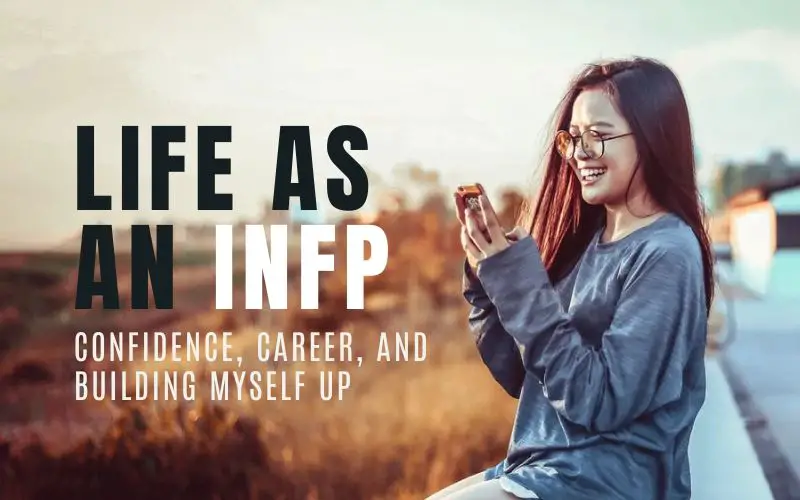Discovering I’m an INFP made a huge turning point in my life.
In this post, let’s get a wee bit personal. I’d share stories on how my INFP-ness both shone or held me back.
Now, what is it like to be an INFP?
***
As a child: I was the Epitome of Confidence
Monologuing and daydreaming were a huge part of my childhood. I still indulge in my imagination as a grownup, but childhood daydreams? They’re incredibly fantastical!
Secret passageways, a fantasy world, and Doraemon-like tools — such daydreams are so vivid and magical.
My 6-year-old self would talk to the mirror, speak between gibberish and English (it’s not my native language, but I was imitating), and play inside my vast imagination using encyclopedia images.
Life was fun and so amazing inside my mind.
But despite a colorful inner life, life is strange as an INFP. I always thought I was different as a young kid.
At an early age, I noticed a distinct disconnect between my and other people’s ideas.
At first, it confuses me how kids my age don’t think the way I do, or why they still do crazy things I know would end up with a punishment.
When I was suggesting ideas to my childhood friends, my mind sometimes question, “why didn’t they think of that. That was obvious.”
Like, WHY?
I felt different but it wasn’t something I haven’t fully grasped before.
And contrary to the usual INFP stereotype, I was not a shy kid.
I starred in plays, was a class achiever, and was elected as a class president multiple times in grade school and high school.
From most people’s perspectives, I was the epitome of confidence. But I know it has something to do with the people around me.
My community was encouraging, and I had nothing to worry about but to do my thing. I’m forever grateful for the support, as they made me feel unstoppable.
I’m so used to being loved and cared for. It’s fun being me without feeling the need to pretend.
However, life doesn’t give you everything you want. And I’m not an exemption.
The Trauma: I Became the Stereotyped INFP

Here comes grade school.
A huge misunderstanding broke out in 5th grade, ultimately changing my view of life.
A fight with my so-called best friend brewed into class bullying.
It started when I told my ex-BFF what I thought was a harmless joke. I jested about giving her phone number to a boy who probably had a crush on her. Of course, I didn’t do it, but she made it a big deal.
All ended with a class bullying and no one talked to me until the school year ended.
I was a transfer student, so she knew them longer than I did. It’s obvious how she can turn the whole class against me.
I took all the blame and responsibility for my actions during those times.
I apologized, close to begging, only to be rejected and pushed around.
Fun times were gone and I was left all alone for the rest of the year.
Every night was silent cries as I kept everything to myself, hiding them from my mom. This was in 5th grade, for goodness’ sake, so for me, it felt like the world breaking down on me.
My mom investigated why I suddenly became so sullen. When she found out, my mom secretly discussed it with the teacher.
Adults getting involved made me panic but I know they’re just trying to help.
However, getting a lecture from the teacher didn’t fix the matters between me and my ex-BFF. In the end, my mom requested the school office to transfer me to a new class the following year.
There, I felt safe and trusted again. A bit of confidence was restored.
But my previous conflict left me with serious damage — trauma and a lesson:
I’ve buried in my mind how I should “think twice about your words and actions.”
Since then, I never voiced my opinions casually. This confident kid got the habit of responding with a smile instead of actually talking.
“Keep your mouth shut,” my mind says. So I did.
With this attitude, no one got issues with me. The new class always described me as the “kindest” in the room.
I walked away from the drama, kept my thoughts to myself, and only spoke to a selected few.
Come to think of it. Aren’t all INFP like this? It’s saddening how INFPs got booming minds but little words — like having clips anchored on our lips.
INFPs are compassionate, imaginative, and confident by nature. But fear, self-consciousness, and aversion to a conflict are all prompted by their environment.
So when people say INFPs are trauma-ed kids? I believe you.
Becoming a Rebellious INFP in my Teenage Years
Fast forward to my teenage years.
INFPs are yes-people, and I was exactly that during high school. I was tolerant of people’s requests, listened intently, and accommodated others’ pleas despite being bothersome.
Whether I like taking the obligation or not, I can’t directly reject people.
It’s always an “okay,” “yes,” or “don’t worry” situation.
“Approachable,” and “thoughtful” — I garnered more positive feedback.
However, such kindness is often subject to abuse.
Dumping tasks on me wasn’t entirely intentional, but to me, the amount of work I received was more than an ordinary high school student should handle. Despite my internal complaints, I was trying my best.
Teachers requested that I create banners and lead classroom decorations. I got sleepless nights finishing school papers so I could distribute tasks the following day and not waste anyone’s time.
People liked my leadership because it was kind and empathetic. To things that they can’t perform, I’d do it—no pressure and drama. Most importantly, I get the job done.
However, all their praises and admiration for my hard work weren’t enough. I was overworked.
And do you know what happens to an overworked and pressured INFP? They disappear.
One midnight, all the accumulated stress burst out in the silence of the dark. I got massive, but quiet cries.
I got fed up with all the stress and pondered on questions that entirely changed my perspectives.
“Why does it always have to be me?”
“Why do I bother with all this work when others don’t exert as much effort?”
“Why do all of us get the same credit even when I did almost all the work?”
I was evolving into the INFP’s dark sides.
Then it hit me. “I didn’t have to” and “I have a choice” were answers that came up.
I carried these questions and answers like a life philosophy and made up my mind.
Since then, I declined all leader positions the following day. Excuses were made more often, and I pushed myself out of school organizations even when they said I should get it.
I still feel my heart throb as I say my first “no” to my friends.
Yet, it was freedom.
However, I picked up a habit that ruined my confidence more.

I was free from tasks, that’s for sure.
But constantly denying responsibilities taught me to be evasive and uncooperative. Worse, I developed a new (and negative) character and carried it to adulthood.
I started hating extra work. If there are no compensations for it, group me out.
As I exercised such aloofness to tasks, my social skills suffered, too. My voice turned quieter to the point that even responding to typical questions from strangers made me quiver.
Turning a confident kid into an avoidant and anxious me took more than 10 years. I was unaware of how I slowly depreciated over time.
I’m still compassionate, kind, and empathetic to people I care about — friends, family, and random people who need a helping hand.
But to people taking advantage of my kindness, I’m so fast detecting them that I seem to judge them earlier than I should have.
Regardless, I don’t want to engage.
In my college years, I was a lone wolf — always uninterested, uncooperative, and sought to be alone rather than be in a wrong set of people.
But despite that, I still achieved the things I wanted. Academic awards and winning intercampus competitions were still possible for me.
But teamwork? I became too independent that no one would bother asking me to do extra work.
The Long Search for a Tribe
I’ve mentally prepared for college. Excitement pours as I imagine how cool college life can be.
However, my block didn’t come as expected because most of my classmates were surprisingly extroverted and sensors.
Fitting in was difficult even when I tried to match their energy.
In the end, their values don’t resonate with mine, yet I need to endure years with them.
They would laugh with sarcastic remarks, bully people as a joke, and dump their responsibilities on someone else. I just can’t, so I had to take the extra mile changing my class schedule whenever I have the chance.
Finding my tribe took me 3 long years. Surprisingly, they were ENFJ and INFJs, always sitting away from the insensitive crowd. And I found them! Thank goodness.
Finding like-minded people was an absolute haven. It’s like discovering an oasis in the middle of a desert or a cold bath after a walk on a humid summer day.
Our empathy, compassion, and humor intuitively connect — it was precious.
I bet many INFPs also struggle with making friends. Do you?
It’s not that we’re not likable. Instead, we’re too selective on who to trust.
I’ve always believed that with friends, they don’t choose us; we choose them.
Hunting and Escaping Careers
Now enters the most frustrating time of my life — careers.
Being an INFP, new things excite the hell out of me. But not until I’m stuck in it and things didn’t go as expected.
Angry bosses, workmates who willingly share toxicity, dishonesty, and gossip – all these contributed to the panic attacks and anxiety I accumulated over the years.
I’ve been to several jobs — customer support, technician, sales staff, teacher — you name it.
I admit. After a few months in a job, I was already thinking of escaping it.
“I need to get out of here,” I thought. Find a better job, go back to school, or start a business — there’s gotta be a rational excuse.
Because if I told them, “I’m not happy,” it was always followed up with a “why?”
And being an INFP, there’s never one specific answer as to why I’m unhappy. And even if I list a hundred reasons, you’d never think it was justifiable.
I just had… enough.
But “having enough” isn’t a reason people around me readily accept.
I’ve been called inconsistent, lazy, and lacking goals.
But what they didn’t understand was that those jobs were killing me mentally and emotionally – over and over again, every day.
Unfortunately, at this current time, who cares about emotions and mental health?
Here’s what’s worse:
Do you know what scared me the most than leaving a job? It’s finding another job and repeating the cycle all over again.
Related Post: INFP Career: Finding the Right Job for INFP
Seeking Myself and Discovering MBTI
It was in the middle of the Pandemic and my job, life, and finances were all boulders in my chest.
My social accounts were deactivated when they should’ve been open for receiving messages.
E-mails were kept unread despite knowing they were necessary. I’ve denied everything, returned to my hiding hole, and kept everyone out.
People misunderstand me. Worse, I don’t even understand myself.
I was a thread close to setting an appointment with a therapist.
But being an INFP, I consumed every available resource I could find before jumping into that.
Self-improvement books? TED Talks? Buddhist and motivational speakers? I read and watched them all.
But only two things eased the emotional chaos I was dealing with for months: Bible sermons and MBTI.
The former is a whole different, spiritual journey.
The latter, the MBTI, was the tool that opened my narrow perspective.
The 16 Myers-Briggs Personalities helped me describe my emotions in words. My internal mess turned into a descriptive and structured understanding of who I truly am.
And the more I seek, the more I find.
The Biggest Realization and Embracing Who I Am
Changes surely didn’t happen in a blink of an eye. Even after knowing I’m an INFP, things didn’t get better fast.
But I woke up to a realization: my whole life was on a path that didn’t resonate with my values. It used none of my strengths. None of me. I lived a life of self-consciousness and only did what was “amazing” in the eye of others.
In my case, people are impressed if I get a job related to my degree, suck up poor work management, and do what everyone does.
Believe me, I wanted to be like other people, too.
I wanted to stick in a job even when pressure knocks me all year round, endure at work despite my personal life crashing down, say my anger out loud, and fight my toxic workmates without bursting into tears.
It seems like everyone around me can do it, except me.
And because I can’t, it confuses my entire work life. “Why can’t I?”
But learning I’m an INFP changed my perspectives. It taught me that I wasn’t built for that.
The most important lesson I had?
“Using our strengths is better than patching up weaknesses.”
And sadly, for me, I’ve always been in a job that required my weaknesses — teamwork, communication, high work pressure, and endurance against toxicity.
INFP life is so hard because society made us believe that life should work in a certain way — that it’s a race, a competition, about having more money, and doing a popular profession.
With that, adult INFP struggle with life as they cut portions of themselves. They tried to fit into a box that was not meant for them.
But that isn’t always true. INFPs are discoverers and are bound to expand.
Inconsistent? Of course, we are. Our cognitive makeup, Extraverted iNtuition (Ne), leads us to find more and more opportunities.
“Focusing on one path leads to success” is a selfish philosophy.
Of course, it isn’t. Hundreds of paths can be taken.
After leaving my job as a college instructor, I’m now a writer and previously a “disappointment” in my family.

No one understood the reasons why I left my job.
Whenever I tell them I’m a writer, some friends tell me, “why don’t you apply at *** company?” setting aside the profession I just told them.
But you see, learning my natural strengths was the puzzle piece I’ve always been searching for.
Sticking to my gift and strengths freed me from anxiety and panic attacks.
Now, I’ve found my place in writing.
It’s not like I’m closing doors to anything. I’m an INFP. I always have ideas. We always do!
If learning about my strengths, stepping up for what I want, and finding happiness in what I do keeps me alive and paying my bills, then what’s wrong?
Nothing.
Nothing should hold back an INFP from using their innate skills and gifts.
Right now, I’m as hopeful as ever.
Despite the fast-paced society and a lot of things crashing down, I can still hold my stand.
Once an INFP listens to their heart and leads their own life, it becomes mind-blowingly peaceful.
This is my INFP life story. It’s a rollercoaster ride, but at least I could now grasp what’s going on — my train of thought, likes, traits, and strengths.
How about you? I hope you find answers to your questions and live as how you understand yourself, too.
Thanks for reading. 🙂
-M.Mathias
Did you like this post? You can buy me a coffee to support my work. Thanks! 🙂
You may also like:
- INFP Sadness and How to Overcome It
- 5 Life Advice for INFP Who Feel Stuck in A Rut
- 6 Things to Remember for INFPs Feeling Lost in Life


